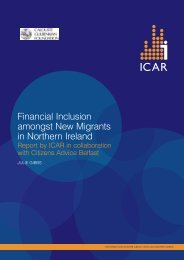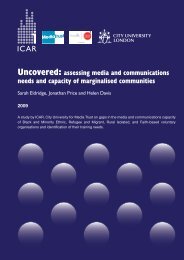The Somali community in the UK: What we know and how we ... - ICAR
The Somali community in the UK: What we know and how we ... - ICAR
The Somali community in the UK: What we know and how we ... - ICAR
You also want an ePaper? Increase the reach of your titles
YUMPU automatically turns print PDFs into web optimized ePapers that Google loves.
Conclusion<br />
Despite <strong>the</strong> seem<strong>in</strong>g difficulty <strong>in</strong> overcom<strong>in</strong>g<br />
divisions etched so deeply by history <strong>and</strong> personal<br />
experience, <strong>Somali</strong> representatives constantly<br />
affirm <strong>the</strong> need for unity to confront <strong>the</strong>ir<br />
predicaments. A s<strong>in</strong>gle voice would speak louder<br />
than sectional appeals. Hopefully, as collaboration<br />
<strong>in</strong>creases bet<strong>we</strong>en <strong>Somali</strong> organisations, <strong>and</strong><br />
<strong>the</strong> younger generation assumes positions of<br />
responsibility, dem<strong>and</strong>s will be made for policies<br />
framed by <strong>the</strong> <strong>community</strong> itself, <strong>and</strong> <strong>the</strong>refore<br />
implemented with more determ<strong>in</strong>ation. To return<br />
to where <strong>we</strong> began <strong>in</strong> this report - <strong>the</strong> production<br />
of <strong>know</strong>ledge on <strong>Somali</strong>s - it already seems that<br />
as more <strong>Somali</strong>s become tra<strong>in</strong>ed researchers,<br />
<strong>the</strong>y will undertake <strong>in</strong>vestigation on topics <strong>the</strong>y<br />
identify for <strong>the</strong>mselves. This could also correct <strong>the</strong><br />
balance of problem-oriented research, towards<br />
an appreciation of what <strong>the</strong> <strong>Somali</strong> <strong>community</strong><br />
already br<strong>in</strong>gs <strong>and</strong> potentially can contribute to<br />
<strong>the</strong> <strong>UK</strong>. In this endeavour to make <strong>the</strong> <strong>Somali</strong><br />
<strong>community</strong> more visible, <strong>and</strong> confirm its presence<br />
as part of British society, <strong>the</strong> active participation of<br />
local authorities as <strong>we</strong>ll as national voluntary <strong>and</strong><br />
statutory bodies is essential. It rema<strong>in</strong>s to be seen,<br />
for example, whe<strong>the</strong>r Liverpool, <strong>the</strong> new City of<br />
Culture, will celebrate <strong>the</strong> ethnic diversity <strong>in</strong> its<br />
midst, <strong>and</strong> whe<strong>the</strong>r <strong>the</strong> <strong>Somali</strong>s’ own voice will be<br />
heard.<br />
A prerequisite for a higher profile for <strong>Somali</strong>s<br />
is accurate numerical data on <strong>the</strong> population.<br />
Pressure must be exerted at a local <strong>and</strong> national<br />
level for <strong>the</strong> availability of statistics on <strong>Somali</strong>s on<br />
which to base both policy <strong>and</strong> future research.<br />
<strong>The</strong>re are also areas where little research has yet<br />
been carried out, such as on <strong>the</strong> second generation<br />
<strong>and</strong> young people born <strong>in</strong> <strong>the</strong> <strong>UK</strong>. <strong>The</strong>n <strong>the</strong>re are<br />
<strong>the</strong> recent arrivals - communities change, <strong>and</strong> <strong>the</strong><br />
relationship with <strong>the</strong> <strong>UK</strong> alters as <strong>the</strong> diaspora<br />
widens <strong>and</strong> <strong>Somali</strong>s arrive <strong>in</strong> <strong>the</strong> <strong>UK</strong> from all over<br />
<strong>the</strong> world. <strong>The</strong>ir particular needs <strong>and</strong> perspectives<br />
need to be considered. And what of men? Much of<br />
<strong>the</strong> best research is focused on women, yet <strong>the</strong>se<br />
accounts also po<strong>in</strong>t out <strong>the</strong> loss of male status <strong>and</strong><br />
esteem that affects men’s roles <strong>and</strong> rebounds both<br />
on <strong>the</strong> <strong>community</strong> <strong>and</strong> women <strong>the</strong>mselves. This is<br />
a complex problem <strong>in</strong> which women’s develop<strong>in</strong>g<br />
confidence potentially clashes with familiar cultural<br />
patterns. <strong>The</strong> perspectives of both <strong>Somali</strong> women<br />
<strong>and</strong> men need to be heard. <strong>What</strong> <strong>we</strong> also lack, <strong>in</strong><br />
spite of <strong>the</strong> length of <strong>the</strong> <strong>Somali</strong> presence <strong>in</strong> <strong>the</strong><br />
<strong>UK</strong>, are longitud<strong>in</strong>al studies - comparative research<br />
carried out over a period of time which would<br />
help identify factors that make for a successful<br />
resettlement experience, <strong>and</strong> those that h<strong>in</strong>der<br />
<strong>in</strong>tegration.<br />
In terms of <strong>the</strong> perennial problems such as service<br />
provision <strong>in</strong> employment, health, education, <strong>and</strong><br />
hous<strong>in</strong>g, exist<strong>in</strong>g material needs collat<strong>in</strong>g <strong>and</strong><br />
more use made of what <strong>in</strong>formation already exists.<br />
Although only a few pieces of research have been<br />
mentioned here by name, <strong>the</strong>y illustrate <strong>the</strong> wide<br />
range of sources that tell us what <strong>we</strong> <strong>know</strong> about<br />
<strong>Somali</strong>s. Limited though some of <strong>the</strong> work may<br />
be, <strong>and</strong> neglectful of <strong>the</strong> <strong>Somali</strong> voice, <strong>we</strong> <strong>know</strong><br />
a great deal - enough to <strong>in</strong>form policy decisions<br />
on this significant refugee population. Although<br />
generations <strong>and</strong> geographical areas differ, <strong>the</strong>re is<br />
enough repetition <strong>in</strong> available material to analyse<br />
<strong>the</strong> major areas of concern. <strong>The</strong>re sometimes<br />
appears to be an unwritten assumption both<br />
<strong>in</strong>side <strong>and</strong> outside <strong>the</strong> <strong>Somali</strong> <strong>community</strong> that<br />
more research will some<strong>how</strong> solve <strong>the</strong> problems<br />
so documented. Is this so? One useful enquiry<br />
might be <strong>in</strong>to <strong>the</strong> career of <strong>the</strong> reports already<br />
produced. <strong>What</strong> happened after <strong>the</strong>ir publication?<br />
<strong>What</strong> policies ensued? <strong>What</strong> are <strong>the</strong> mechanisms<br />
necessary to translate research <strong>in</strong>to result? One<br />
conclusion that can be drawn from this present<br />
report is <strong>the</strong> need for evaluation. We might suggest<br />
that where <strong>the</strong> purpose of research is a series<br />
of policy recommendations, <strong>the</strong> orig<strong>in</strong>al fund<strong>in</strong>g<br />
should <strong>in</strong>clude <strong>the</strong> requirement - <strong>and</strong> <strong>the</strong> budget<br />
- for an <strong>in</strong>dependent evaluation of outcomes after<br />
a stipulated period of time. This would determ<strong>in</strong>e<br />
to what extent <strong>the</strong> recommendations have been<br />
implemented, what has resulted, what problems<br />
have been encountered <strong>in</strong> meet<strong>in</strong>g objectives, <strong>and</strong><br />
what lessons can be learned from <strong>the</strong> process of<br />
transform<strong>in</strong>g proposal <strong>in</strong>to practice. For what is<br />
needed is concrete action to end <strong>the</strong> feel<strong>in</strong>g of<br />
exclusion among <strong>the</strong> <strong>Somali</strong> <strong>community</strong> <strong>in</strong> <strong>the</strong> <strong>UK</strong>.<br />
<strong>The</strong> <strong>Somali</strong> <strong>community</strong> <strong>in</strong> <strong>the</strong> <strong>UK</strong><br />
71

















